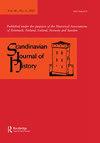丹麦新自由主义转向中的商业之声
IF 0.8
3区 历史学
Q1 HISTORY
引用次数: 0
摘要
摘要许多历史学家认为,北欧福利社会在20世纪后期经历了一场重大变革,新自由主义被认为是这场变革的关键驱动力。这篇文章对当代史的这一领域做出了贡献,因为它探讨了有组织的商业在丹麦新自由主义转变中的修辞和作用,特别关注丹麦工业联合会。本文运用概念历史方法,确定了有组织企业沟通中的竞争力修辞,并追溯了这种修辞从20世纪70年代到2010年代的变化。这导致识别出两个不连续性。首先,这篇文章展示了20世纪80年代的转型,工业家们越来越多地呼吁国家参与,以提高私营部门的竞争力,尤其是在研究和创新方面。其次,这篇文章展示了2010年代的转变,竞争力的修辞采用了可持续性的理念。从这一分析中得出的是一个相当务实的新自由主义版本,它诞生于商业利益,自20世纪80年代末以来,它被发展成为丹麦政策精英共识的一个组成部分。本文章由计算机程序翻译,如有差异,请以英文原文为准。
The Voice of Business in Denmark’s Neoliberal Turn
ABSTRACT Many historians have argued that the Nordic welfare societies underwent a major transformation in the later decades of the 20th century, and neoliberalism has been identified as a key driver of this transformation. This article contributes to this field of contemporary history as it addresses the rhetoric and role of organized business in Denmark’s neoliberal turn, focusing especially on the Confederation of Danish Industry. Using conceptual historical methodology, the article identifies a rhetoric of competitiveness in the communication of organized business and traces how this rhetoric changed from 1970s to 2010s. This leads to the identification of two discontinuities. First, the article shows how the 1980s saw a transformation in which the industrialists increasingly called for state engagement to further competitiveness in the private sector, especially in relation to research and innovation. Second, the article shows how the 2010s saw a transformation in which the rhetoric of competitiveness adopted ideas about sustainability. What emerges from this analysis is a rather pragmatic version of neoliberalism that was born out of business interests and which since the late 1980s was developed as an integrated part of a consensus in the Danish policy elite.
求助全文
通过发布文献求助,成功后即可免费获取论文全文。
去求助
来源期刊

SCANDINAVIAN JOURNAL OF HISTORY
HISTORY-
CiteScore
1.10
自引率
20.00%
发文量
33
期刊介绍:
Scandinavian Journal of History presents articles on Scandinavian history and review essays surveying themes in recent Scandinavian historical research. It concentrates on perspectives of national historical particularities and important long-term and short-term developments. The editorial policy gives particular priority to Scandinavian topics and to efforts of placing Scandinavian developments into a larger context. Studies explicitly comparing Scandinavian processes and phenomena to those in other parts of the world are therefore regarded as particularly important. In addition to publishing articles and review essays, the journal includes short book reviews. Review essay proposals and polemical communications are welcomed.
 求助内容:
求助内容: 应助结果提醒方式:
应助结果提醒方式:


